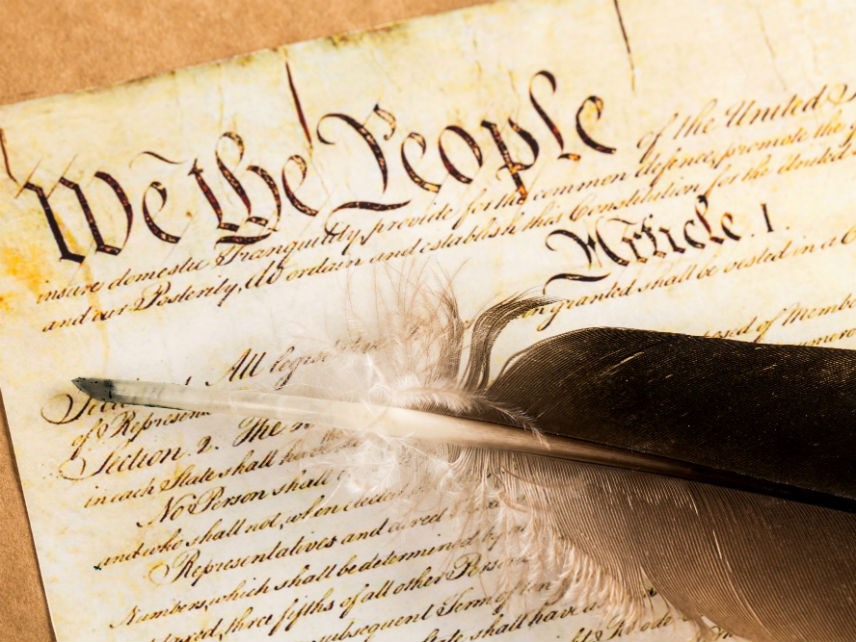Reason Staffers Share Their Favorite Constitutional Amendments
The U.S. Constitution was signed on this day 231 years ago.

The United States Constitution was signed on September 17, 1787. Since then, the document has grown by 27 amendments. To celebrate the Constitution's 231st birthday, I asked the Reason staff to pick one of their favorite amendments and tell us why they like it so much.
Katherine Mangu-Ward, Editor in Chief
Which amendment did you pick?
The 13th.
Why?
It's important to admit when you make mistakes, and slavery was our biggest one as a nation.
Jesse Walker, Books Editor
Which amendment did you pick?
The 3rd.
Why?
The 1st and 4th and 5th may sound better, but those amendments have been shot full of holes. This is the one item in the Bill of Rights that is still clearly working.
Eric Boehm, Reporter
Which amendment did you pick?
The 10th.
Why?
The Supreme Court has held that the 10th Amendment added nothing to the meaning of the Constitution—that is, that the document itself is clearly a limitation on the powers of the federal government. Still, I wonder where we'd be today without the explicit counterbalance that the 10th Amendment provides against the implied powers of the Commerce Clause and the Supremacy Clause. Not every policy problem has a federal solution, and the 10th says we shouldn't always be looking for one; let the states find their own way.
C.J. Ciaramella, Criminal Justice Reporter
Which amendment did you pick?
The 14th.
Why?
States are cool, but sometimes they also suck. When County Commissioner Hogg* decides to step all over your due process, or the local sheriff decides that certain civil liberties aren't for those people, the 14th Amendment is there to smack them around.
Matt Welch, Editor at Large
Which amendment did you pick?
The 3rd.
Why?
When my daughter was like 5, I asked her on July 4 why the Americans had gotten mad at the king of England. Her answer? They didn't like British soldiers sleeping in their houses whenever they wanted. There is wisdom both practical and metaphorical in that notion.
Elizabeth Nolan Brown, Associate Editor
Which amendment did you pick?
The 19th.
Why?
Because people should be treated equally under the law regardless of their sex or gender, and that includes U.S. women being able to participate in the same state-sanctioned symbolic rituals as their male counterparts.
Scott Shackford, Associate Editor
Which amendment did you pick?
The 9th.
Why?
How can you not love an amendment that makes it explicit that the purpose of the Constitution is to define the limits of government authority and to make it very, very clear that it's not our lawmakers and judges who "grant" us rights like benevolent nobles?
Joe Setyon, Assistant Editor
Which amendment did you pick?
The 15th.
Why?
While the 13th and 14th amendments made slavery illegal and said African Americans had equal protection under the law, the 15th affirmed their all-important right to vote. Freedom is great and necessary, but if you can't have a say in who makes the laws, are you really free?
Tammy Barry, Grantwriter
Which amendment did you pick?
The 1st.
Why?
Shot full of holes as it may be, the 1st Amendment secures (along with the 2nd) the Declaration's promise that the government derives its just powers from us, the people. Without it, serfdom is a much more certain destination. Without it, we'd be travelling in an amorphous crazyland like Great Britain: criminalizing speech via arbitrary measures, and giving police license to monitor noncriminal speech as well.
Peter Suderman, Managing Editor (Online)
Which amendment did you pick?
The 21st.
Why?
If you enjoy a beer, a glass of wine, a shot of liquor, or a well-measured cocktail, raise a glass to the 21st Amendment, which in 1933 ended 13 years of Prohibition (and a wide array of unintended consequences) by repealing the 18th Amendment. In addition to ending the federal government's poorly enforced and socially ruinous ban on booze, it also has the distinction of being the only amendment ratified by state conventions instead of state legislatures. Its existence is a victory for both personal autonomy and culinary artistry, and it provides hope that, with enough time and pressure, serious policy mistakes can (eventually) be corrected.
Brian Doherty, Senior Editor
Which amendment did you pick?
The 2nd.
Why?
The 2nd Amendment, whether deliberately or not, embodies a vital fact: Although government is supposedly utterly necessary for our safety and thriving, its ability to specifically defend our lives from direct threat is practically non-existent, and at the very least it ought not interfere with our ability to preserve ourselves and our loved ones lives from such threats.
Robby Soave, Associate Editor
Which amendment did you pick?
The 1st.
Why?
Censorship is the defining characteristic of a dictatorship. "So long as men can speak and write freely…they still have a chance to reform their society," Ayn Rand once said. "When censorship is imposed, that is the sign that men should go on strike intellectually." Rand made those remarks during the course of an interview with Playboy, which drives the point home, I think.
Zuri Davis, Assistant Editor
Which amendment did you pick?
The 8th.
Why?
A fair justice system requires the punishment to always fit the crime. In a perfect world, the equal application of the 8th Amendment would challenge such practices as mandatory minimums, the death penalty, and exorbitant sentences for nonviolent drug offenders.
*CORRECTION: This piece originally identified the fictional character of Boss Hogg as the sheriff of Hazzard County, Georgia. He was in fact the county commissioner.


Show Comments (67)